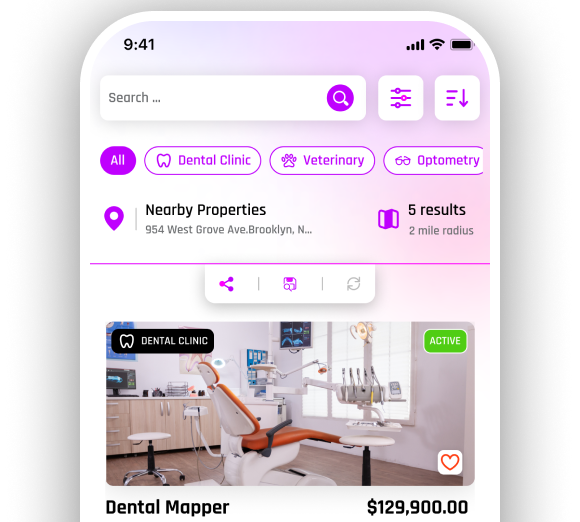How Does Inflation Affect a Dental Practice Valuation – Know from active medical practice listing app!

Inflation has a direct impact on all sectors of the economy, including healthcare. Dental practices are not excluded from this. The cost of services and goods has inflated, affecting the practice value and operational aspects of a dental practice. Influence in valuation of dental practices is an important aspect to know before making any financial decision for owners, sellers, and buyers.
Understanding Dental Practice Valuation
-
Revenue and Profitability: A practice’s revenue and profit margins are key indicators of its value.
-
Assets: Tangible assets like dental equipment, real estate, and technology investments contribute to the valuation.
-
Patient Base: A loyal and established patient base increases a practice’s market value.
-
Location: Prime locations, particularly in growing areas, boost a practice’s worth.
-
Growth Potential: Practices with room for growth or those offering specialized services may be valued higher.
How Inflation Impacts Dental Practice Valuation
1. Increased Operating Costs
For dental practices, inflation drives up the prices of utilities, labor, and supplies that is connected with higher operating costs. It may become costly if you are looking for dental equipment for sale, office supplies, sterilization materials, and rent. Inflation in operating costs is linked with reduced profitability. It directly impacts on the valuation of the practice. Potential buyers will observe a lower profit margin as a red flag, causing a reduced valuation.
2. Higher Patient Costs
Dental practices need to increase their fees to cover rising costs during inflation. This is helpful for maintaining profitability and also decreases patient retention and reduces the need for non-essential services. In this regard, cosmetic dentistry, a solely electronic procedure, faces more difficulty.
3. Changes in Labor Costs
Labor is considered the most significant expense for a dental practice. With inflation, the cost of living increases as wages become high and workers demand higher compensation. In the case of dental practices, it refers to increased salaries for dental assistants, hygienists, and administrative staff. The overall value of practice will be reduced if the cost rises farther than a practice and adjust the service fees and shrink all profit margins.
4. Impact on Patient Acquisition and Retention
Healthcare acquisition and mergers are affected by inflation. It plays an important role in navigating a practice’s valuation. It is a period of uncertainty, and patients are more willing to cut back on discretionary spending, which includes healthcare costs. Out-of-pocket expenses can experience slower growth or decline in the patient base, impacting the practice's long-term value.
5. Depreciation of Assets
Within an inflationary environment, office furnishing and dental equipment, like tangible assets may depreciate. The reason is inflation erodes the buying power of money, making it more expensive to replace worn-out equipment. A practice looking for expensive dental equipment to buy upgrades during inflationary period may consider its valuation decrease due to the rise of operating costs.
6. Higher Interest Rates
High interest rates always accompany inflation, which affects both sellers and buyers in the dental practice market. For buyers, increased interest rates mean loans for buying dental practice becoming more expensive. Hence, a pool of potential buyers can be reduced which leads to decrease in demand and selling price. For sellers, it results into longer time period to sell their practice or face high borrowing costs.
How to Mitigate Inflation’s Impact on Dental Practice Valuation
While inflation can negatively affect dental practice valuations, there are strategies that owners can use to mitigate its impact:
1. Adjust Fees Proactively
Dental practices can daily adjust and review their service fees to keep with the increased costs. Increase in incremental fees can be more acceptable for the patients than a single large hike.
2. Optimize Operational Efficiency
Finding different ways to reduce unnecessary expenses of increase operational efficiency can assist in reducing the effect of increasing costs. Negotiating better supply deals, streamlining process or investing in modern technology to enhance patient care and operational management can improve profitability.
3. Diversify Service Offerings
Stabilizing revenue sources can be achieved by providing a combination of mandatory and optional services. During periods of inflation, dental practices that provide necessary care may be more resilient than those that only focus on discretionary services.
4. Maintain a Strong Patient Base
Developing and preserving a solid rapport with patients is essential to surviving inflationary pressures. To keep patients loyal even in the face of shifting economic situations, practices should concentrate on delivering exceptional treatment and patient experiences.
5. Monitor Asset Value
Maintain an eye on the worth and state of the practice's material assets, and think about updating them when the time is right. Even in times of inflation, investing in top-notch machinery or technology can help set the practice apart and increase its value.
The Role of Practice Finder
Whether you are looking to buy, sell, or evaluate a dental practice, staying informed about how inflation affects the valuation process is critical. Practice Finder, a leading practice listing app, connects buyers and sellers of dental practices with comprehensive insights, expert guidance, and up-to-date market information. With Practice Finder, you can find the right practice at the right price, even in challenging economic conditions.
FAQs
1. How does inflation affect dental practice operating costs?
The cost of labor, supplies, and utilities rises with inflation, which can lower profitability and have a negative effect on a dental practice's valuation.
2. Can dental practices raise fees to offset inflation?
Yes, dental practices can adjust their fees to reflect rising costs, but they must balance this with patient retention and affordability.
3. What happens to the value of dental equipment during inflation?
In an inflationary economy, tangible assets like dental equipment may lose value more quickly, increasing the cost of replacement and thus decreasing the value of a practice.
4. How can Practice Finder help in buying or selling a dental practice?
Practice Finder connects buyers and sellers with the latest market insights and expert guidance, making it easier to navigate dental practice transactions even during inflationary periods.

